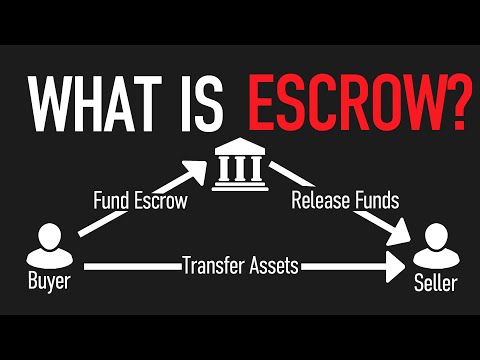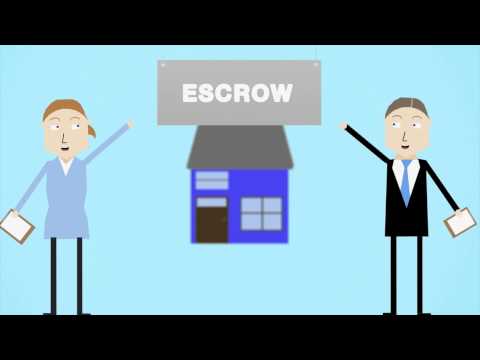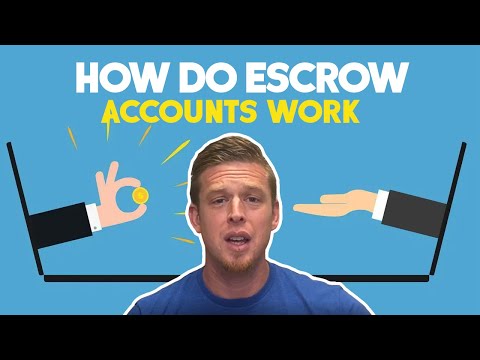Explaining What is an Escrow
When diving into the world of real estate, the term “escrow” pops up as frequently as caffeinated agents at an open house. Escrow, as defined by the California Department of Real Estate (DRE), involves a neutral third party—known as the escrow holder—holding onto documents, funds, or valuables until a specific event occurs or certain conditions are met.
Imagine a scenario where you’re eyeing a charming vintage bungalow you’ve found while perusing Our bungalow renovation, and you’ve decided to take the leap. During the buying process, escrow would ensure your earnest money check (a good-faith deposit) stays safe with an escrow agent until closing day.
Companies like Escrow.com exemplify this definition in a practical sense, safeguarding assets for two parties in a transaction until all agreed-upon conditions are fulfilled. It’s the safety net that provides peace of mind in transactions stuffed with dollars and dreams.

How Does Escrow Work: The Inner Workings Explained
Picture this: you’re buying a vintage arcade machine celebrating the pac man 30th anniversary, but it’s halfway across the country. You wouldn’t send a wad of cash to a stranger, right? Enter escrow. The escrow process in real estate is quite similar, and here’s how it unfolds:

| **Aspect** | **Details** |
|---|---|
| Definition of Escrow | Escrow is a legal arrangement in which a neutral third party (the escrow holder) temporarily holds money, property, or important documents for a real estate transaction until specific conditions are fulfilled. |
| Purpose of Escrow | The purpose of escrow is to protect all parties involved in the transaction—buyers, sellers, and lenders. It ensures that no property or funds change hands until all conditions in the agreement have been met. |
| Parties Involved | – Buyer(s) – Seller(s) – Escrow Holder/Agent (neutral third party) – Lenders (if applicable) |
| How Escrow Works | The buyer and seller agree to terms and deposit documents, funds, and instructions with the escrow holder. The escrow holder releases these to the appropriate party only when all conditions are met, such as inspections, financing, or repairs. |
| Benefits of Escrow | – Reduces risk of fraud – Ensures funds are safe – Facilitates transfer of property and money smoothly – Prevents premature transfer of property – Helps in timely payment of taxes and insurance through escrow accounts in mortgage payments |
| Ownership of Escrow Funds | The buyer owns the funds in escrow. The escrow agent is merely holding the funds in trust, and ownership only changes hands when the transaction’s obligations are satisfied, and the funds are released to the seller. |
| Escrow in Mortgage Payments | In the context of mortgage payments, lenders often require an escrow account to collect funds for property taxes and homeowners insurance. This ensures these bills are paid on time, which protects both the lender and the homeowner. |
| Escrow vs. Closing Date | The closing of escrow signifies the completion of the agreement between buyer and seller. The closing date, on the other hand, may occur after the closing of escrow if title transfer has not yet been executed. This is when official ownership changes hands. |
| Good or Bad? | Generally considered beneficial, escrow adds a level of assurance and trust to the transaction process for all involved parties. It mitigates the risk of default by either party and assures the obligations are met before finalizing the transaction. |
The Functions and Benefits of Escrow Accounts
What is an escrow account, you ask? It’s essentially a piggy bank, overseen by a third party, holding funds that cover the costs associated with homebuying—think of it like a stash for your real estate cookies.
For buyers and sellers, it means security. Picture two kids on a seesaw, balanced perfectly. That’s the buyer and seller, with the escrow account smack in the middle, ensuring no one falls off until it’s time to dismount gracefully. And when financial giants like Wells Fargo and Bank of America are at the helm, you can bet your bottom dollar it’s a stable seesaw.

Escrow Payment: Ensuring Secure Transactions
In the same way Amazon acts as a stronghold for your cash when you splurge on the latest gadget, an escrow payment in real estate is your money’s bodyguard. It’s the assurance that your hard-earned money won’t vanish before the keys are in hand. The escrow payment sits tight, snug, and secure until every ‘i’ is dotted and each ‘t’ crossed.

Escrow Mortgage: A Layer of Financial Security
Think of an escrow mortgage as one of those fancy all-in-one tools. It neatly bundles your property taxes, homeowners insurance, and, sometimes, other fees with your monthly mortgage payment. Lenders, like the good folks at mortgage Lenders near me, appreciate escrow because it minimizes the risk of tax liens and uninsured losses.
When you ponder “what is escrow on mortgage,” imagine a financial butler who ensures bills are paid on time without you lifting a finger.

The GI Bill Certificate of Eligibility and Escrow Implications
For veterans brandishing their GI Bill certificate of eligibility like a financial shield, the escrow process is a familiar battlefield. It not only smoothens the path to homeownership but, as per the U.S. Department of Veterans Affairs’ advice, it safeguards their well-earned benefits ensuring proper payment distribution.
Veterans need not fear the escrow conundrum; it’s a maneuver that keeps their financial interests locked, loaded, and secure.
Impounds: Setting Aside Funds for Homeownership
When you hear “impounds,” think of a savings vault for your future homeownership expenses. Here’s how it goes down:
It’s a forward-looking approach, ensuring the bills get paid while you sleep soundly at night.
Navigating Escrow in Various Transactions
Escrow isn’t only for buying homes or cast tropic thunder DVDs. In M&A deals, as managed by big shots like JPMorgan Chase, escrow safeguards against post-closing adjustments and indemnity claims. It’s the economical grease that keeps global financial gears spinning with fewer squeaks and creaks.
Practical Steps: Engaging with the Escrow Process Effectively
Successful navigation through the escrow jungle requires a blend of common sense and smart strategy. Agents from Keller Williams agree—ensure the escrow officer is a neutral party, keep a detailed record of all documents, and communicate, communicate, communicate! Arm yourself with knowledge, and you’re halfway to the finish line.
Escrow Mistakes to Avoid: Insights from Industry Insiders
Even seasoned players can fumble with escrow. Don’t overlook contingency periods; they’re there for your protection, like a shin guard in a soccer game. Misunderstanding fees is another common blip—like assuming your What Is a mortgage broker search would explain all the closing costs (hint: it won’t). Take it from the pros—scrutinize every detail with an eagle’s eye.
The Nuances of Escrow: Advanced Considerations for Buyers and Sellers
Escrow isn’t just passing paper and shaking hands. Holdbacks, for example, can retain a portion of the seller’s proceeds until certain repairs are completed. And if the ship hits the sand, escrow dispute specialists are your financial life raft, mediating choppy waters to resolution.
Escrow in the Digital Age: Technological Advancements and Trends
As digital sages predict trends, the escrow realm isn’t left behind. Blockchain begets transparency, while smart contracts program conditions into unbreakable code. The escrow evolution is digital dynamism at its finest, from platforms like Zillow to personal finance pioneers armed with automated escrow advices.
Conclusion: Mastering Escrow for Secure Transactions
In summary, escrow is your transaction’s knight in shining armor. Whether it’s the secure exchange of property, stashing funds for future bills, or the intricate tapestry of a mortgage escrow account, it’s all about protection and peace of mind. Dive in with confidence and savvy; a successful transaction is a well-escrowed transaction.
What Is an Escrow? Unpacking the Mystery!
When you’re diving into the world of buying a house, you’ll bump into a lot of jargon that can make you feel like you’re reading ancient Greek. But fear not! One of those terms is “escrow,” and it’s not as daunting as it may seem. It’s actually your financial buddy, ensuring that everything goes as smooth as Zippolar ice.
The Trusty Middleman
Picture this: You’ve found the home of your dreams, and you’re ready to seal the deal. But whoa there, partner! Before you and the seller start celebrating, there’s an important step—enter the escrow. Think of it as a trusty middleman, holding onto your hard-earned cash until all details are locked in and everyone’s happy as a clam.
Money on Ice
So, you might be wondering, “What does this escrow do with my money?” Well, it’s like putting your funds on ice. Your dough is kept in a secure account, colder and untouchable than a snowman’s wallet, while inspections and negotiations are happening. Nobody can get their hands on it—not you, not the seller, not even a pesky polar bear. This way, you won’t have to sweat bullets about your money walking away.
More Than Just Money
But wait, there’s more! An escrow doesn’t just babysit your money. It also looks after other crucial pieces of the puzzle, like the deed to the home and other important documents. They ensure that all these precious papers are only passed over once every I is dotted and every T is crossed.
“What is an escrow?” You Say?
You’ve asked, so let’s recap. “What is an escrow?” It’s your financial guardian angel throughout the homebuying process. Without it, you’d be navigating a tightrope without a safety net. And let’s be real, unless you’re a circus performer, that’s not a position you want to be in. Just picture an escrow as a comfy cushion, ready to catch you if anything goes wibbly-wobbly during the deal.
You see, with escrows in place, both the buyer and the seller can have a sigh of relief and not get their feathers ruffled. It’s a promise that everyone will play fair in the sandbox, and it’s as crucial to buying a home as a hammer is to a carpenter. So next time someone tosses out the word “escrow,” you can just wink and nod, knowing that it’s as cool and necessary as the “zippolar” link in the chain of home buying.
In essence, escrows are the unsung heroes of the real estate world, the silent protectors that make sure your journey to homeownership isn’t a rollercoaster without any brakes. Now, armed with your newfound knowledge, you can swagger into the home-buying process with confidence that could outshine a knight’s armor. So, let’s give it up for escrows, folks—the sturdy safety nets of the property purchase circus!

Who owns the money in an escrow account?
Who owns the money in an escrow account?
Well, here’s the lowdown: when it comes to the dosh stashed in an escrow account, it’s all yours—sort of like your little financial pillow fort. The escrow agent’s just babysitting your cash until it’s time to make a move. Once you’ve crossed the t’s and dotted the i’s on your deal, that money makes a beeline to the seller, all neat and tidy-like.
What does escrow mean on a house?
What does escrow mean on a house?
Heads up, house hunters! Escrow’s kinda like your real estate seatbelt—keeping everything safe until you reach the final destination. In simple terms, it’s where all the important stuff is parked—cash, deeds, the kitchen sink—held by a neutral third party until the house deal seals the deal. Hallelujah!
Should you pay escrow?
Should you pay escrow?
Paying escrow? Yep, it’s pretty much like adding whipped cream to your financial pie—it’s smart, it’s smooth, and it keeps the surprises at bay. By chipping in for property taxes and homeowners insurance as part of your mortgage payment, you’re making sure nothing slips through the cracks. No late fees, no oopsie daisies!
Should I remove escrow from my mortgage?
Should I remove escrow from my mortgage?
Thinking about kicking escrow to the curb? Hold your horses! While flying solo can feel freeing, it means you’ve gotta juggle tax and insurance bills on your own. If you’re the type that has your ducks in a row, budget wizard-style, you might handle it like a pro. Otherwise, keeping escrow could mean fewer headaches.
What are the disadvantages of escrow?
What are the disadvantages of escrow?
Let’s spill the tea on escrow’s not-so-fun side. It can feel like a financial straitjacket—restricting your cash flow and leaving you at the mercy of the escrow holder’s estimates. If they overshoot your bills, you’re overpaying until they figure it out. And sometimes, sorting out overages can be as slow as molasses.
How long can money be held in escrow?
How long can money be held in escrow?
Money in escrow doesn’t just sit around getting dusty—it waits for its grand exit until the show’s over, and that can take anywhere from 30 days to a few months. It’s all part of the real estate dance, where everyone keeps in step till the final curtain—the closing of your home purchase.
Can I take money out of my escrow account?
Can I take money out of my escrow account?
Dreaming of dipping into your escrow cookie jar? That’s a no-go, my friend. That cash is locked in tighter than Fort Knox, all in the name of keeping the home-buying promise land smooth sailing. Breaking into it could sour your sweet deal, so it’s hands-off until closing time.
Is escrow money my money?
Is escrow money my money?
But of course! Your escrow moolah is yours until it does its job—waving goodbye as it settles your home-buying debts. Think of it as your money taking a detour around Risky Road, ensuring everyone gets their fair shake without a hitch.
What happens if I pay off my escrow balance?
What happens if I pay off my escrow balance?
Wiping out your escrow balance? It’s like hitting the home-owning jackpot! Once all the bills have been settled up, any extra dough in the escrow account comes back to you. It’s like a personal rebate for being on top of your game!
Is escrow good or bad?
Is escrow good or bad?
So, is escrow the hero or the villain in your home-buying saga? Most folks would tip their hat to it—it’s like a trusty sidekick keeping the bad guys at bay, making sure buyers and sellers play nice, and ensuring all the i’s are dotted so you can sleep easy at night. Thumbs up to that!
Do you get an escrow refund every year?
Do you get an escrow refund every year?
Every year, your escrow’s like a crystal ball—predicting your homeownership expenses. If the stars align and you’ve paid too much, you’ll get a refund. But if the opposite happens, brace yourself for a higher mortgage payment to cover the gap. It’s the rollercoaster of responsible adulting!
Why am I paying so much in escrow?
Why am I paying so much in escrow?
If your escrow’s thicker than your favorite winter coat, it means your lender’s playing it safe, tucking away enough to cover taxes and insurance. Sometimes they overshoot the runway, and you’re left with more escrow than you bargained for. Don’t fret! It usually gets sorted out with a refund or a payment adjustment down the road.
Can your mortgage go up because of escrow?
Can your mortgage go up because of escrow?
Absolutely! If your escrow account starts to feel a bit too snug, like a pair of skinny jeans after Thanksgiving dinner, it’s probably because your taxes or insurance premiums have gone up. When the escrow part of your mortgage balloons, it’s time for your monthly payments to stretch too.
Can a house fall out of escrow?
Can a house fall out of escrow?
Oh, it can tumble out of escrow faster than a clown on a unicycle if things go sideways. If inspections go belly up, financing falls through, or someone gets cold feet, that house deal can slip right through your fingers. It’s the not-so-funny part of the home-buying circus.
Can you pull money from your escrow account?
Can you pull money from your escrow account?
Hate to burst your bubble, but pulling money from your escrow is like trying to get a loan from your cat—ain’t gonna happen. That cash is earmarked for important stuff like taxes and insurance. You’ve gotta wait till the grand finale —the closing—before any curtain calls on that money.
What are the rights of an escrow account?
What are the rights of an escrow account?
Your rights with an escrow account are like the fortress protecting your castle from chaos. You’ve got the right to accurate statements, timely payments on your bills, and a heads-up if your payments are changing. And if things go south, you’re entitled to dispute errors and get them fixed pronto.
Can I spend my escrow refund?
Can I spend my escrow refund?
That escrow refund landing in your lap? It’s yours to treat like a mini jackpot. Use it wisely—maybe pad your savings or pay down debt. Or, hey, live a little and splurge on something nice. Just remember, it’s not a free lunch; it’s just the universe giving you back what was already yours.
Where does the money come from in an escrow account?
Where does the money come from in an escrow account?
The cash in an escrow account comes straight outta your pocket, riding shotgun with your mortgage payment each month. It’s your dough, set aside like a squirrel’s winter stash to cover the biggies—taxes and insurance. So when the bills roll in, you’re golden.



